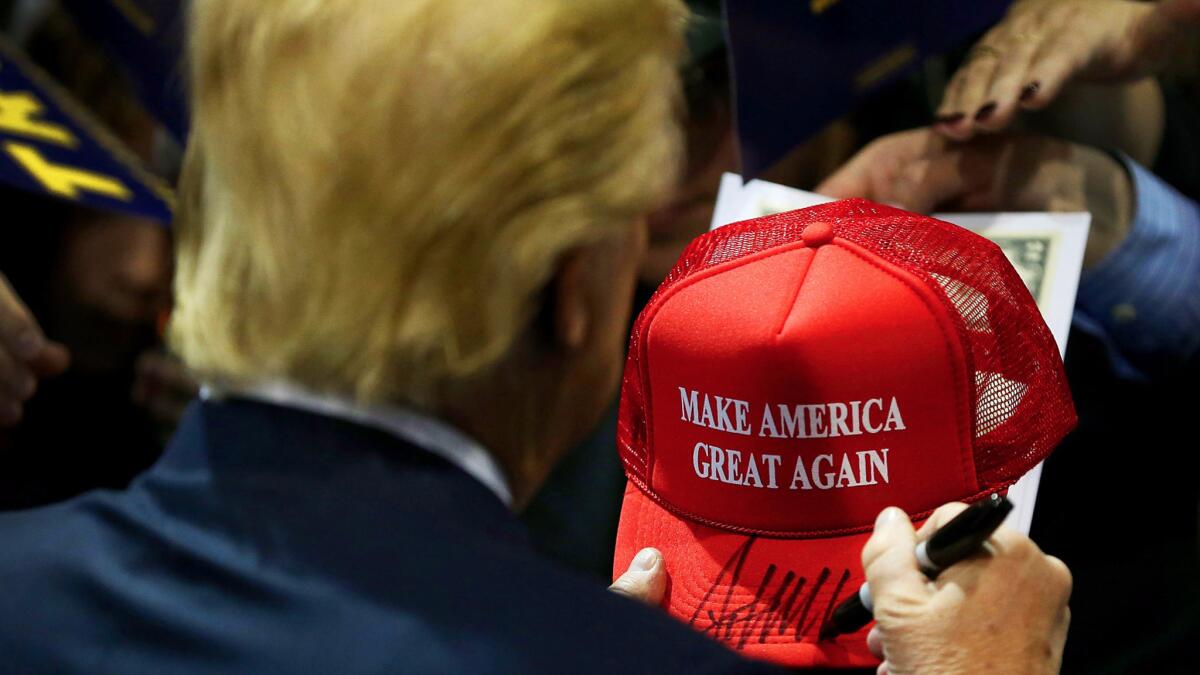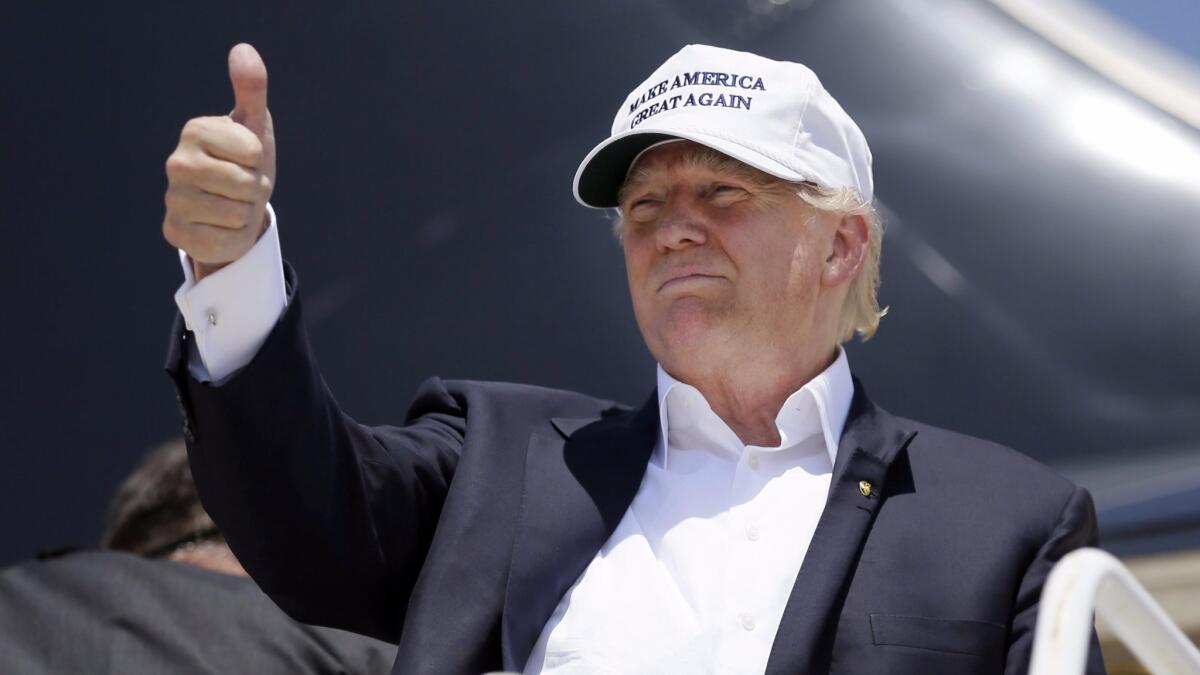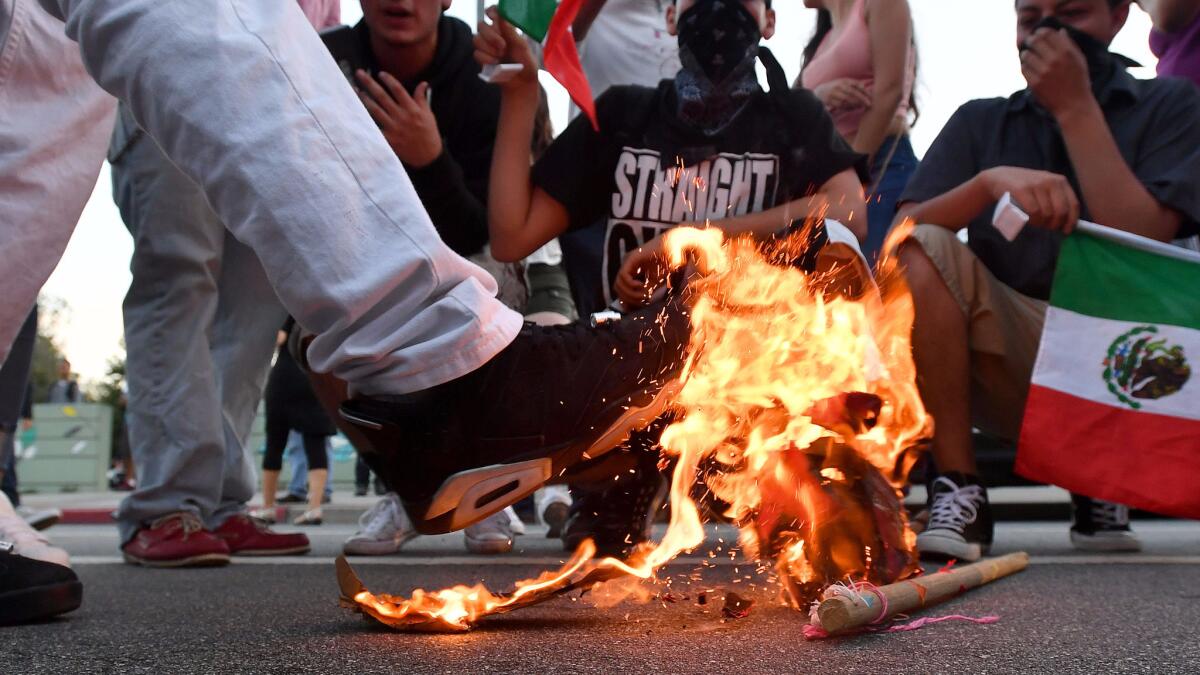It’s been worn, memed and burned: How Donald Trump’s ‘Make America Great Again’ hat reflects a nation’s anger

- Share via
It has been burned. It has been memed. It has been stomped in protest. And it has topped the heads of thousands of supporters of presumed GOP presidential nominee Donald Trump. It is the fire-engine-red baseball cap emblazoned with the all-caps command, “MAKE AMERICA GREAT AGAIN.”
In an election that has been rife with the preposterous — from national debates about tiny hands to social media posts about taco salad — Trump’s campaign hat has come to represent something deeper in the American psyche: a bubbling well of anger.
Like any effective piece of campaign memorabilia, the hat reduces complex issues to a single object. The searing redness channels frustration. The slogan — with its connotations of isolationism and xenophobia — is presented in capital letters, Internet comments style, to whomever might be in forehead range.

“It’s memorable — even if the implications of what he is saying is terrible,” says George Lois, the renowned New York ad man and graphic designer who devised iconic covers for Esquire and conceived the “I Want My MTV” campaign in the early ’80s. “It’s very strong on a red cap. The red baseball cap implies that it’s kind of an American staple. It’s worn by real people.”
And at this point, it’s unforgettable. The hat has become the “I Like Ike” button and Obama “Hope” poster of our time — the official objet d’art of an election that has turned into one long, bad-hair-day episode of reality TV.
Which means, of course, that the hat has been knocked off by bootleg vendors and reimagined through relentless memes — from “Make America Mexico Again” to “Make America Gay Again” to “Make America Skate Again,” the latter worn by Lil Wayne in a music video.
“It’s infuriatingly good,” says Lois — who worked on Robert F. Kennedy’s New York senatorial campaign in 1964. “And it’s really infuriating because [Trump] is a terrible person. I know him personally.”

This isn’t the first time that a baseball cap has made it onto the political stage. During the 1992 presidential campaign, Bill Clinton became known for putting on different baseball caps while jogging.
“Often they were caps that people gave or sent to him,” says James Lilliefors, the author of “Ball Cap Nation: A Journey Through the World of America’s National Hat.” “After Clinton became president, his deputy press secretary, Lorraine Voles, was asked by People magazine how many caps he owned. ‘There are too many to count,’ she said.”
But Trump’s hat stands alone in capturing the zeitgeist of our overheated times.
The hat — or at least a version of it — made its first recorded appearance on July 23, 2015, in Laredo, Texas, when the candidate donned a white rope baseball cap with the slogan “Make America Great Again” for a tour of the border.
It became a sensation almost instantaneously (social media quickly took note of the new headgear) — and was soon seared into the national consciousness through repeat appearances in campaign photographs and broadcast television.
By the fall, the candidate had adopted the hat — which ensured the elements would not disturb the delicate architecture of his hair — as a wardrobe staple. It quickly became a top seller in his online campaign store, where it retails for $25 a pop in various shades, including the most widely known fiery red.
At this point, it is unknown who designed the cap. Neither the Trump campaign nor the Southern California company that produces the hat, a Carson-based manufacturer called Cali-Fame, responded to requests for comment.
But the designers and critics I spoke with said its success feels more like a colossal fluke than a thoughtfully considered project. (In that way, it mirrors the Trump candidacy itself.)
“A genius didn’t design it,” says Lois. “I’m sure he just gave the job to a hat maker and they probably gave him two or three typefaces to choose from and he picked one.”
Zachary Petit, who edits the design magazine Print, described the cap’s design as quite “jarring.”
“The shape, the font — Times New Roman? — and composition,” he stated in an email, “makes one think it might have quickly been drawn up in Microsoft Word by a campaign intern as a one-off, not realizing the power it would go on to have.”
But what the hat lacks in sophistication — “Trump is clearly not pandering to designers,” jokes Petit — it makes up for in scrappy punch.
“It’s a strong visual,” says Lois. “The red hat stands out in an audience.”
The campaign now sells a version with even larger all-caps type — which feels even scream-ier.
When Trump hats first became a pop cultural phenomenon last year, at least one fashion writer dubbed them an “ironic must-have fashion accessory.” But as the campaign has progressed, the hat has taken on more sober overtones.
MORE: Inside the Southern California factory that makes the Donald Trump hats »
Trump’s derogatory statements against Muslim refugees and Mexican immigrants, his incitements to violence and the ways in which those statements have emboldened hate groups, make the “Make America Great Again” slogan exclusionary and uncomfortable.
Place that slogan against a sea of red and it feels downright combative.
“In terms of aesthetics, I believe [the hat] fails spectacularly,” writes Petit. “But if the objective of design is to communicate and sell — it works wonders.”
And in this case, quite regrettably, the product on sale is anger.
MORE:
On TV, rage has become the new romance
Anger is an energy for a new wave of women in pop culture
The Player: A pioneer of first-person shooter games talks guns, violence and catharsis
More to Read
The biggest entertainment stories
Get our big stories about Hollywood, film, television, music, arts, culture and more right in your inbox as soon as they publish.
You may occasionally receive promotional content from the Los Angeles Times.











